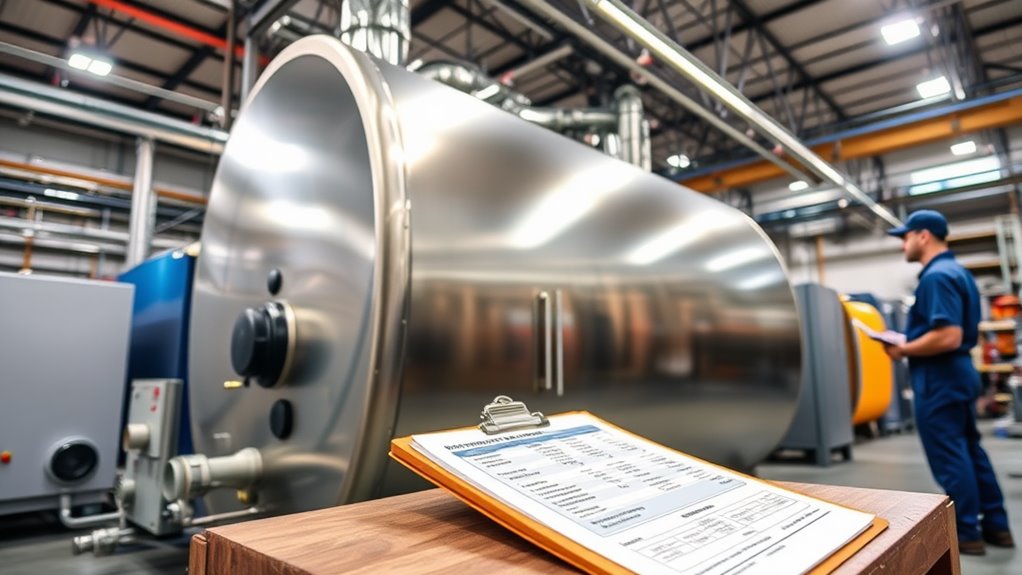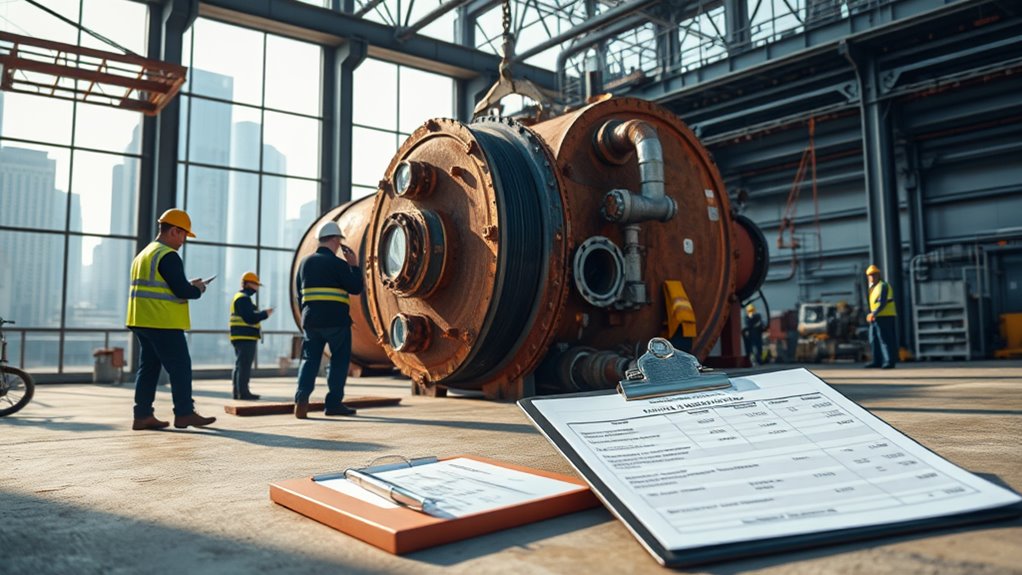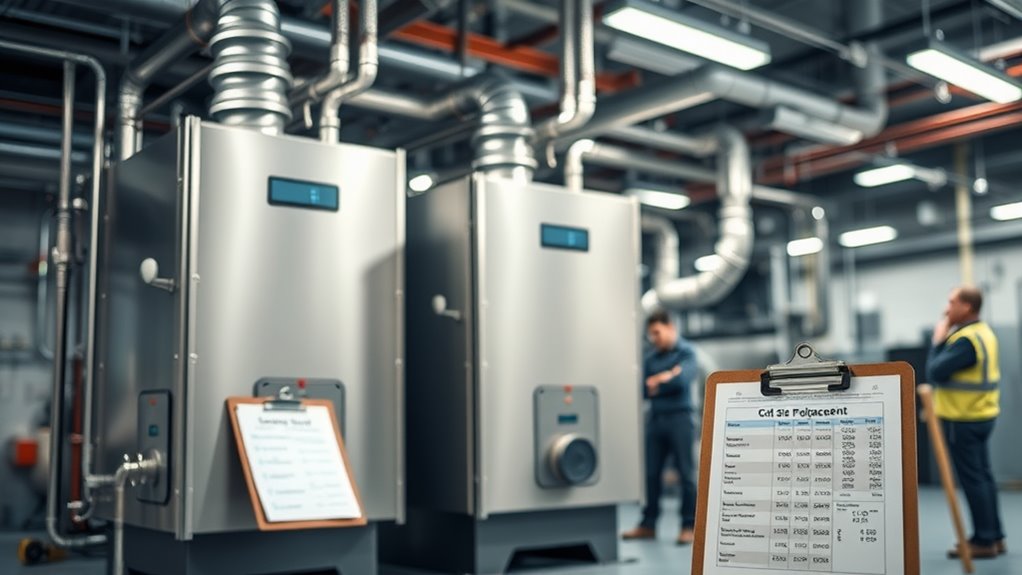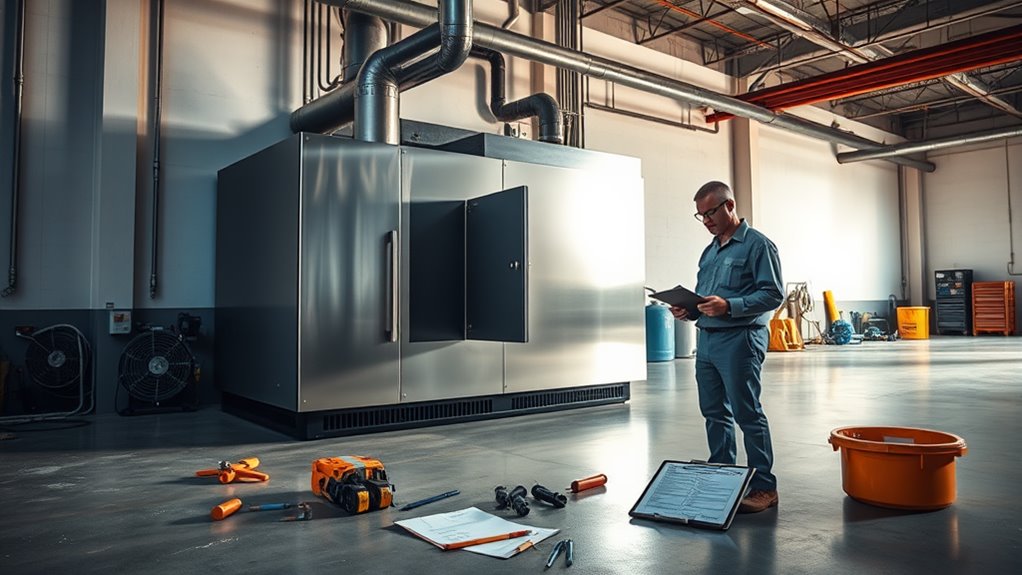Replacing a commercial boiler typically costs between $5,000 and $50,000. The price varies based on factors like size, type, and installation complexity. Smaller units may range from $5,000 to $10,000, while larger systems can exceed $50,000. Installation expenses and labor rates also influence total costs. Additionally, considering energy efficiency can lead to long-term savings on operating expenses. Understanding these factors helps in budgeting effectively for your boiler replacement project, and more details follow.
Key insights
- Smaller commercial boilers cost between $5,000 and $10,000, while mid-sized units range from $10,000 to $25,000.
- Larger boiler systems can exceed $25,000, sometimes reaching $50,000 or more, depending on capacity.
- Installation complexity and labor rates vary by region, significantly impacting total replacement costs.
- Ongoing maintenance and emergency repairs contribute to long-term expenses beyond initial replacement costs.
- Financing options, including loans and government incentives, can help offset the initial investment for boiler replacement.
Understanding Commercial Boiler Types

When it comes to commercial boilers, understanding the various types available is essential for making informed decisions. You'll encounter several boiler types, including fire-tube and water-tube boilers, each suited for specific boiler applications. Fire-tube boilers are efficient for lower-pressure systems and are often used in smaller industrial settings, while water-tube boilers handle higher pressures and are ideal for larger facilities. Additionally, you should consider condensing boilers, which maximize energy efficiency by recovering heat from flue gases. Knowing these distinctions allows you to match the right boiler type to your operational needs, ensuring peak performance and energy savings. Ultimately, selecting the appropriate boiler type can greatly impact your facility's operational efficiency and overall costs. Moreover, choosing a boiler with advanced technology can lead to significant reductions in fuel consumption and lower energy bills.
Factors Influencing Boiler Replacement Costs

Several key factors influence the costs associated with replacing a commercial boiler, and understanding these can help you budget effectively. First, the boiler brand reputation plays an essential role; well-established brands often come with higher upfront costs due to their reliability and efficiency. Additionally, installation timeline factors can greatly affect expenses. If you require a quick replacement, labor costs may increase due to expedited service or overtime charges. Furthermore, the complexity of the installation, including modifications to existing systems or building constraints, can lead to higher costs. Evaluating these elements allows you to make informed decisions and potentially mitigate unexpected expenses during your commercial boiler replacement process. Regular commercial boiler service is also critical to ensure optimal performance and longevity, which can influence replacement decisions.
Average Cost Estimates for Different Boiler Sizes

As you consider replacing a commercial boiler, understanding the average cost estimates for different boiler sizes is vital for effective budgeting. The cost varies markedly based on boiler capacity. For instance, smaller units (around 100,000 BTUs) typically range from $5,000 to $10,000, while mid-sized boilers (up to 500,000 BTUs) can cost between $10,000 and $25,000. Larger systems (over 500,000 BTUs) often exceed $25,000, sometimes reaching $50,000 or more. When performing a cost comparison, factor in not just installation expenses, but also potential operational costs tied to boiler capacity. Ultimately, selecting the right size impacts long-term efficiency and expenditure, making it essential to align your choice with your facility's specific heating demands. Regular maintenance of energy-efficient heating systems can also significantly reduce operational costs over time.
The Role of Energy Efficiency in Cost

While considering the cost of replacing a commercial boiler, energy efficiency plays an essential role in determining long-term expenses. High-efficiency boilers typically have a higher upfront cost but considerably reduce energy consumption. This translates into substantial cost savings over time, as they operate with lower fuel bills. You'll want to evaluate the Annual Fuel Utilization Efficiency (AFUE) rating; a higher rating indicates better energy efficiency. Investing in models with advanced technology, such as condensing boilers, can lead to even greater savings. Additionally, many utility companies offer rebates for energy-efficient installations, further offsetting initial costs. Ultimately, evaluating energy efficiency not only optimizes operational costs but also supports your business's sustainability goals. Furthermore, commercial heat pumps can achieve up to 400% efficiency, providing an alternative solution for businesses looking to enhance energy efficiency.
Installation Costs and Labor Expenses

Installation costs and labor expenses can greatly influence the overall budget for replacing a commercial boiler. The complexity of the installation techniques you choose directly impacts these costs. For instance, if you opt for advanced installation methods that require specialized skills, expect higher labor rates. Typically, labor rates vary by region and can considerably affect your total expenditure. It's essential to gather quotes from different contractors to compare their pricing and expertise. Additionally, consider the time frame of the installation; longer projects may lead to increased labor costs. By carefully evaluating these factors, you can better manage your budget and guarantee a successful boiler replacement that meets your operational needs. Regular maintenance is crucial for energy efficiency and prolonging the lifespan of your new boiler system.
Additional Costs to Consider
When replacing a commercial boiler, you need to factor in additional costs beyond just the equipment and installation. Installation labor expenses, necessary permits and inspections, and ongoing maintenance and repairs can greatly impact your budget. Understanding these elements will help you prepare for the total investment required. Regular inspections are essential for maintaining ongoing compliance and safety, which can also influence your overall costs.
Installation Labor Expenses
Considering the complexities involved in replacing a commercial boiler, installation labor expenses can considerably impact your overall budget. The labor rates vary widely based on your location, the experience level of the technicians, and the specific installation techniques required for your system. For example, if your installation involves unique configurations or integration with existing systems, expect higher labor costs. Additionally, the complexity of the project can extend the timeline, leading to increased expenses. You should also factor in potential overtime rates if the installation extends beyond regular hours. Ultimately, obtaining detailed quotes from multiple contractors will provide a clearer picture of these labor expenses, ensuring you allocate sufficient funds for a successful boiler replacement. Moreover, regular maintenance such as commercial power flush can help prolong the lifespan of your new boiler and improve overall system efficiency.
Permits and Inspections
Replacing a commercial boiler often requires obtaining various permits and undergoing inspections, which can add significant costs to your project. Understanding the permit requirements and the inspection process is essential for budgeting accurately. Here are four key factors to take into account:
- Permit Fees: Different jurisdictions impose varying fees for boiler replacement permits.
- Inspection Costs: Inspections may require payment for each visit by an official to guarantee compliance.
- Time Delays: The approval process can extend timelines, potentially increasing labor costs.
- Re-inspection Fees: If your installation doesn't meet standards initially, additional inspections can incur further charges. Regular maintenance helps prevent error codes and can also contribute to smoother inspections.
Maintenance and Repairs
While it's easy to focus solely on the upfront costs of replacing a commercial boiler, ongoing maintenance and potential repairs can greatly impact your overall budget. Regular maintenance, including routine inspections, is essential for ensuring boiler longevity. These inspections can identify minor issues before they escalate into costly repairs. You should budget for these maintenance tasks, which may include cleaning, part replacements, and system calibrations. Failing to conduct routine inspections not only risks boiler efficiency but can also lead to unexpected downtime, further increasing costs. Additionally, consider setting aside funds for emergency repairs, as these can arise without warning. By proactively managing maintenance and repair expenses, you can protect your investment and maintain peak operational efficiency. Regular checks for low water pressure can help prevent issues like the E119 error code, which may lead to costly repairs if not addressed promptly.
Potential Savings From Upgrading
Upgrading to a modern commercial boiler can yield significant savings, often reducing energy costs by 20% to 30%. This investment not only enhances efficiency but also contributes to long-term financial benefits. When conducting a cost analysis, consider the following potential savings:
- Lower Energy Bills: Enhanced efficiency translates directly to reduced monthly expenses.
- Increased Equipment Lifespan: Modern boilers are built to last, minimizing replacement frequency.
- Reduced Maintenance Costs: Newer models often require less frequent servicing, lowering upkeep expenses.
- Tax Incentives and Rebates: Many jurisdictions offer financial incentives for energy-efficient upgrades. Additionally, investing in a new boiler can help avoid frequent servicing issues associated with older models that may require more maintenance over time.
Financing Options for Boiler Replacement
When considering boiler replacement, you'll encounter various financing options tailored to your needs. You can evaluate loan options, compare leasing versus buying, and explore government incentive programs that may reduce your overall costs. Understanding these financing avenues is essential for making an informed decision that aligns with your budget and operational goals.
Loan Options Available
How can you effectively manage the financial burden of replacing a commercial boiler? Exploring various loan options can ease this process. Here are four key considerations:
- Assess Loan Eligibility: Review your business credit score and financial history to determine the types of loans you qualify for.
- Choose a Lender: Compare banks, credit unions, and online lenders to find the best rates and terms.
- Understand Repayment Terms: Look for loans with flexible repayment schedules that align with your cash flow.
- Evaluate Total Costs: Factor in interest rates and fees to understand the overall expense of financing.
Leasing vs. Buying
Deciding between leasing and buying a commercial boiler can greatly impact your financial strategy and operational efficiency. Leasing benefits include lower upfront costs, predictable monthly payments, and the flexibility to upgrade to newer models without significant financial burden. This option often allows you to allocate capital for other critical business needs while maintaining operational continuity.
On the other hand, buying a boiler can lead to long-term savings, as you'll own the asset outright and avoid ongoing lease payments. However, buying drawbacks include the high initial investment and potential obsolescence, as technology rapidly evolves. Carefully evaluate your cash flow, maintenance responsibilities, and future expansion plans to choose the most suitable financing option for your business's specific needs.
Government Incentives Programs
Exploring financing options for replacing a commercial boiler often leads to contemplation of government incentive programs. These programs can greatly offset initial costs, making replacement more manageable. Here are some key options you should consider:
- Government Grants: These funds don't require repayment, easing your financial burden.
- Energy Rebates: Utility companies often offer rebates for energy-efficient equipment, providing immediate savings.
- Tax Credits: Certain energy-efficient upgrades may qualify for tax incentives, benefiting your bottom line.
- Low-Interest Loans: Some government programs provide favorable loan terms to finance your boiler replacement.
Frequently Asked Questions
How Long Does a Commercial Boiler Replacement Typically Take?
When you're considering a commercial boiler replacement, the boiler installation timeline typically ranges from a few days to a couple of weeks. This timeframe depends on several factors, like the complexity of your commercial heating systems and the availability of parts. You'll want to coordinate with your contractor to guarantee minimal disruption to your operations. Proper planning and communication can streamline the process, making your shift to a new boiler smoother and more efficient.
What Are the Signs That a Boiler Needs Replacement?
You should watch for several signs that indicate your boiler needs replacement. If your boiler's age exceeds 15 years, it's likely less efficient and prone to performance issues. Look out for unusual noises, fluctuating temperatures, or rising energy bills, as these can signal declining performance. Additionally, frequent repairs may suggest that investing in a new boiler is more cost-effective than maintaining an aging unit. Don't ignore these warning signs; they could save you money in the long run.
Can I Replace My Boiler Myself?
You might consider replacing your boiler yourself, but there are critical DIY considerations to weigh. Boiler installation involves complex systems that require technical expertise, including plumbing and electrical knowledge. If you're not experienced, you could inadvertently create safety hazards or violate local codes. Plus, improperly installed boilers may lead to costly repairs down the line. It's often wiser to consult a professional to guarantee compliance and peak performance of your heating system.
Are There Warranties Available for New Commercial Boilers?
Yes, there are warranties available for new commercial boilers, and they vary greatly. Typically, warranty durations range from one to ten years, depending on the manufacturer and model. You'll find coverage options that may include parts, labor, or both. It's essential to read the warranty details carefully, as limitations can affect your long-term costs. Choosing a boiler with a robust warranty can save you money on repairs and replacements down the line.
What Maintenance Is Required After Replacing a Commercial Boiler?
After replacing your commercial boiler, regular boiler maintenance is essential. You should schedule routine checks to guarantee peak performance. This includes inspecting the pressure and temperature settings, checking for leaks, and cleaning components like filters and burners. Don't forget to monitor the system's efficiency and address any unusual noises or vibrations. Keeping a detailed log of these maintenance activities can help you identify trends and potential issues before they become significant problems.
Summary
To summarize, replacing a commercial boiler involves several factors that influence overall costs, including type, size, and installation expenses. While initial investments may seem high, the long-term savings from improved energy efficiency can greatly offset these costs. It's essential to evaluate financing options and consider all additional expenses to guarantee a thorough budget. Ultimately, making an informed decision now can enhance operational efficiency and reduce future energy bills, benefiting your business in the long run.

